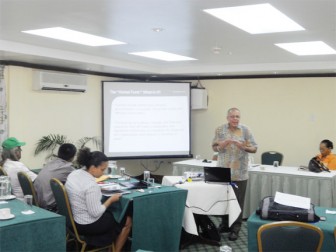Malaria and tuberculosis (TB) cases will continue to increase, because of the influx of persons into the mining districts, failure to complete treatments, inadequate contributions from civil society and poverty, according to speakers at the Guyana Country Coordinating Mechanism (CCM) constituency consultation on tuberculosis and malaria held at the Cara Lodge boardroom last Thursday.
The consultation was a follow-up to the World Health Organisation (WHO) conference held in Panama earlier this year. Its objective was to address the problem of combating malaria, tuberculosis and HIV and forward recommendations to participating donor countries.
Dr Ruben del Prado, UNAIDS country coordinator, advised that collaboration is necessary since multiple organisations are in pursuit of a common goal; and country proposals are made, based on information garnered from these organisations, to the Global Fund for grants to finance projects. The Guyana CCM is responsible for making these proposals, as well as ensuring that guidance in planning, and use of funds is provided. Further, the Guyana CCM is tasked with coordinating all aspects of projects in the quest to eradicate TB, malaria and HIV in Guyana; this includes overseeing health systems.

Sarah Insanally, another speaker, explained eligibility requirements of countries. She informed that the Global Fund relies on voluntary financial contribution from all sectors of society–governments, private sector, social enterprises, philanthropic foundations and individuals. These contributions help in the prevention, treatment, and eradication of malaria, tuberculosis, and HIV.
Dr Jeetendra Mohanlall, Country Manager of the national tuberculosis programme bemoaned the fact that due to limited funds, his programme lacked the ability to comprehensively deal with cases identified. The most frustrating part of the programme, he said, is that persons do not complete their treatment, and this creates more difficult strains of the disease. In addition, 44% of persons tested last year did not return for their results and treatment, although approximately 33% tested positive for TB.
Also, particularly in the prison situation, the lack of trained personnel, and unavailability of adequate space have hampered attempts to ensure a decrease in the incidence of TB. Non engagement of communities, as well as the prohibitive cost of transport to outlying /interior terrains, was also identified as major setbacks. Dr Mohanlall stressed the need for decentralization of community workers in these areas, so as to improve their effectiveness.
To end his presentation, the doctor express-ed the need for more public assistance. He identified a decline in the funds received within the last two years. This, he observed, has had a direct impact on Guyana’s ability to deal with the disease.
Survival Supermarket was named as the lone local donor to the organization and Mohanlall expressed sincere gratitude while pleading with other companies to follow suit. Survival Supermarket pledged to supply soups to persons taking treatment for the disease. The names of persons who can be contacted in order to make contributions, either in human resource or monetary form were provided.
Programme coordinator of the Guyana Malaria Eradication Programme Indal Rambajan reiterated that rising gold prices have lured more persons into the hinterland, leading to an increase in malaria cases. This disease is therefore not under control nor does eradication seem imminent, he stated. He is concerned that Brazil has made significant progress in eradicating malaria since it stopped mining, but Brazilians have since poured into Guyana to mine, contributing to this country’s increase.
Consequently, the problem of malaria is no longer only seen in the interior regions, but in all areas of Guyana. The unavailability of mosquito nets in the quantities required, and the fact that malaria sufferers do not complete treatment, also contribute to the increase in malaria cases, Rambajan lamented. He called on the public to become informed, and pleaded with miners to join the fight in malaria protection and prevention by simply sharing learned information about the disease.





